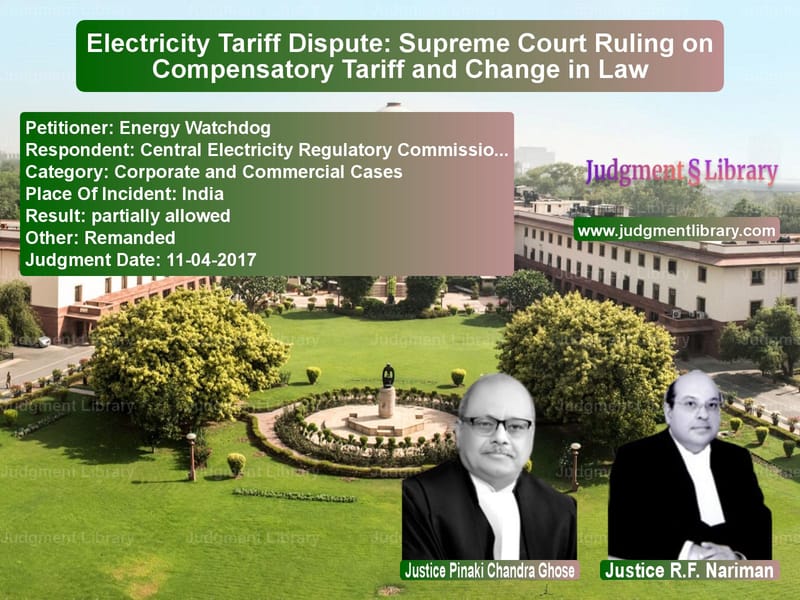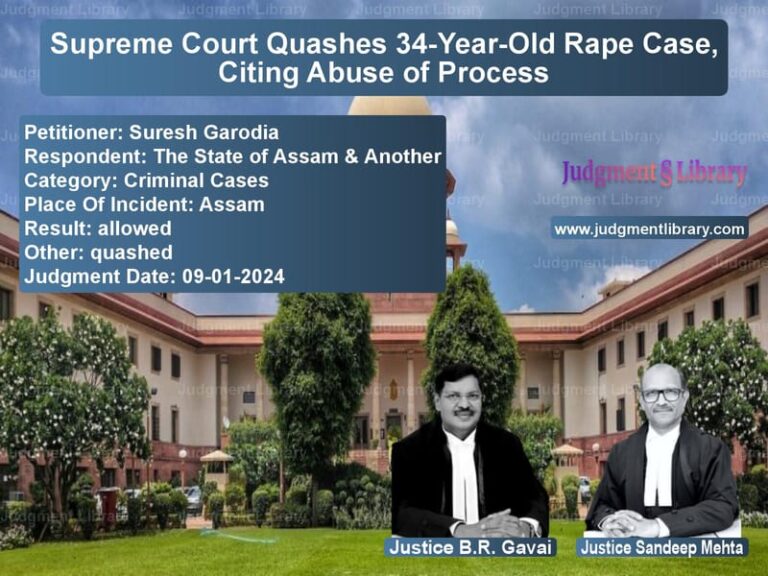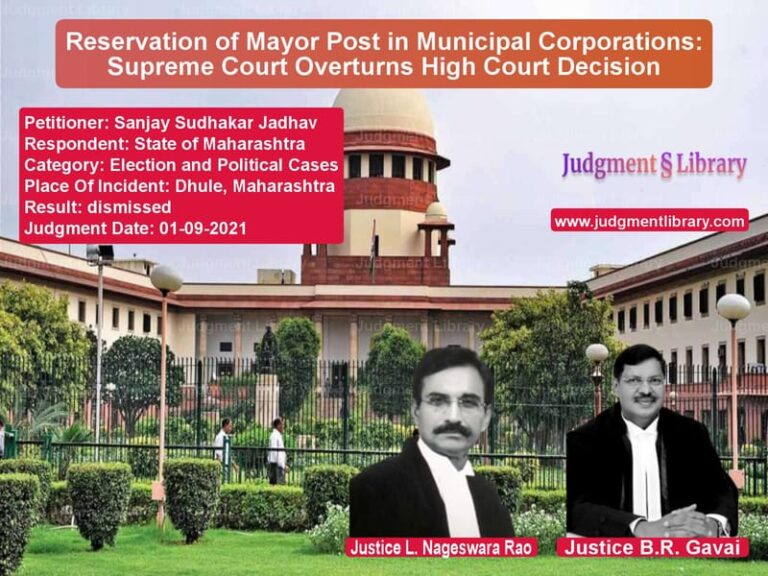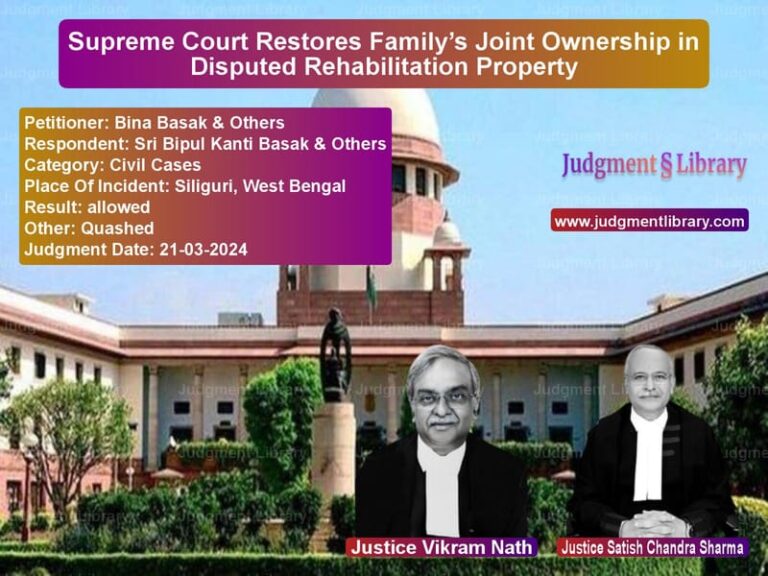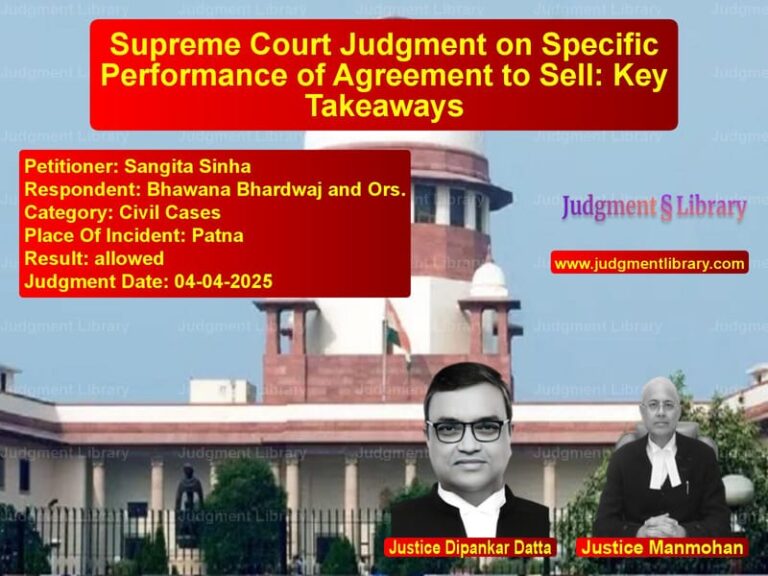Electricity Tariff Dispute: Supreme Court Ruling on Compensatory Tariff and Change in Law
The case of Energy Watchdog vs. Central Electricity Regulatory Commission & Others is a landmark judgment dealing with the determination of electricity tariffs, applicability of compensatory tariffs, and the interpretation of ‘Change in Law’ and ‘Force Majeure’ clauses in power purchase agreements (PPAs).
The Supreme Court was called upon to decide whether power-generating companies could claim compensatory tariffs due to the increased cost of coal, following a change in Indonesian law that significantly raised coal prices. The ruling clarifies whether such foreign regulatory changes can qualify as a ‘Change in Law’ under Indian contracts and sets an important precedent for the power sector.
Background of the Case
The appeals arose from a judgment of the Appellate Tribunal for Electricity (APTEL) dated April 7, 2016. The primary issue revolved around changes in Indonesian coal pricing laws and whether power generators, including Adani Power and Coastal Gujarat Power Ltd. (CGPL, a Tata Power subsidiary), could claim compensatory tariffs due to increased fuel costs.
Both companies had entered into long-term PPAs with various state distribution companies (DISCOMs) under a competitive bidding process as per the Electricity Act, 2003. The agreements did not include any clauses for compensatory tariff adjustments in case of an increase in fuel costs due to foreign laws. When Indonesia changed its laws in 2010, mandating that all coal exports be priced based on international market rates, the cost of imported coal surged dramatically, leading to financial distress for the power producers.
The affected power companies approached the Central Electricity Regulatory Commission (CERC) seeking compensatory tariffs. While the CERC ruled in favor of granting relief, the decision was challenged before APTEL and ultimately reached the Supreme Court.
Arguments by the Petitioners
The petitioners, including Energy Watchdog and the State DISCOMs, argued that:
- The power purchase agreements (PPAs) were awarded based on competitive bidding, and the bidders assumed the risk of fuel price fluctuations.
- The contracts did not provide for tariff revision due to increased fuel costs, and allowing compensatory tariffs would violate the sanctity of competitive bidding.
- The increase in coal prices due to Indonesian law does not qualify as a ‘Change in Law’ under Indian law or the Electricity Act, 2003.
- Force Majeure cannot be invoked in this case, as the price increase did not make performance impossible; it only made it commercially unviable.
Arguments by the Respondents
The respondents, including Adani Power and Tata Power’s CGPL, argued that:
- The unforeseen change in Indonesian regulations directly impacted their cost of coal procurement, rendering the PPAs unviable at the agreed rates.
- They did not have control over the regulatory changes, making it a classic case of Force Majeure.
- The increased costs due to Indonesian law should be considered under ‘Change in Law’ clauses, allowing them to revise tariffs accordingly.
- Without tariff adjustments, they would suffer severe financial distress, ultimately affecting electricity supply.
Supreme Court Judgment
The Supreme Court, comprising Justices Pinaki Chandra Ghose and R.F. Nariman, delivered a crucial ruling that:
- Foreign regulatory changes do not qualify as ‘Change in Law’ under Indian contracts unless explicitly mentioned in the agreement.
- Force Majeure does not apply in cases where performance remains possible but becomes financially unviable.
- Tariffs agreed upon in competitive bidding cannot be revised unless permitted by the contract itself.
- The power producers cannot claim compensatory tariffs simply because of increased costs unless a clause in the agreement allows such adjustments.
- The CERC and APTEL orders granting compensatory tariffs were quashed, and the matter was remanded for reconsideration under domestic ‘Change in Law’ provisions.
Key Excerpts from the Judgment
The Supreme Court ruled:
“A Change in Law must be construed strictly. Foreign laws do not constitute ‘Change in Law’ under Indian PPAs unless expressly included. A price rise in coal does not qualify.”
On Force Majeure, the Court stated:
“Force Majeure applies only when an event renders performance impossible, not when it merely makes it more expensive.”
Legal Precedents Considered
- Energy Watchdog vs. CERC (2016) – Establishing principles on Change in Law in power contracts.
- Gujarat Urja Vikas Nigam Ltd. vs. Tarini Infrastructure (2016) – Ruling that competitive bidding terms must be strictly enforced.
- Adani Power Maharashtra Ltd. vs. Maharashtra Electricity Regulatory Commission (2015) – Discussing compensatory tariffs under the Electricity Act.
Implications of the Judgment
- The ruling protects the integrity of competitive bidding by ensuring tariffs remain fixed as per agreements.
- Power companies must account for potential regulatory risks in fuel procurement when bidding for PPAs.
- The decision clarifies that Force Majeure and Change in Law clauses must be interpreted strictly.
- Future contracts may include explicit provisions for foreign regulatory changes if power producers want tariff protection.
Conclusion
The Supreme Court’s ruling in Energy Watchdog vs. CERC sets a precedent in electricity tariff disputes. By rejecting compensatory tariffs based on foreign law changes, the Court reinforced the principle that contractual terms must be strictly followed. This decision has long-term implications for the power sector, ensuring transparency and predictability in tariff determination.
Don’t miss out on the full details! Download the complete judgment in PDF format below and gain valuable insights instantly!
Download Judgment: Energy Watchdog vs Central Electricity Supreme Court of India Judgment Dated 11-04-2017.pdf
Direct Downlaod Judgment: Direct downlaod this Judgment
See all petitions in Company Law
See all petitions in Mergers and Acquisitions
See all petitions in Corporate Compliance
See all petitions in Judgment by Pinaki Chandra Ghose
See all petitions in Judgment by Rohinton Fali Nariman
See all petitions in partially allowed
See all petitions in Remanded
See all petitions in supreme court of India judgments April 2017
See all petitions in 2017 judgments
See all posts in Corporate and Commercial Cases Category
See all allowed petitions in Corporate and Commercial Cases Category
See all Dismissed petitions in Corporate and Commercial Cases Category
See all partially allowed petitions in Corporate and Commercial Cases Category

